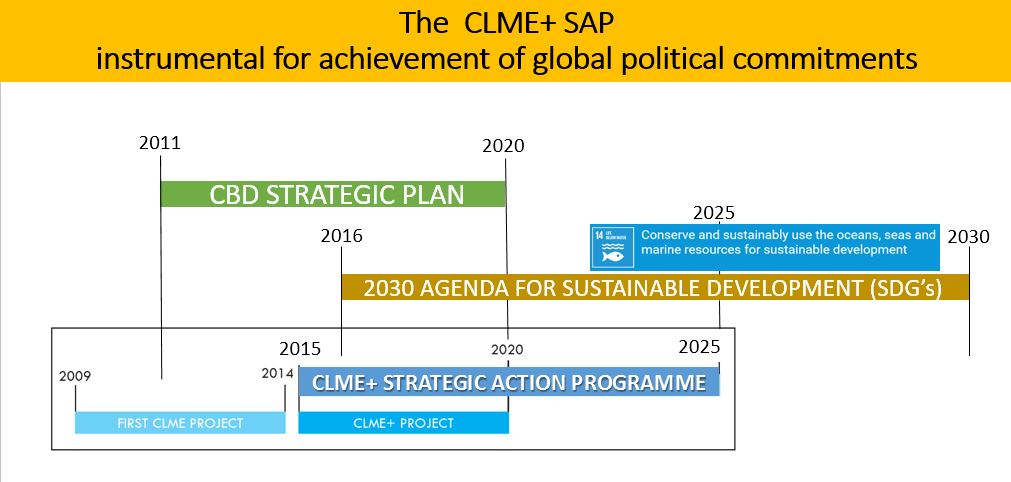March 27, 2017 – The Global Environment Facility (GEF), through its International Waters (IW) Focal Area, financially supports the adoption of the “Large Marine Ecosystem approach” for the collaborative, transboundary management of shared marine resources. In this context, the GEF and UNDP foster the adoption of a cyclical approach of joint (a) Transboundary Diagnostic Analysis (TDA) and (b) Strategic Planning.
In the CLME+ region, key transboundary problems and their associated root causes were identified during the diagnosis phase: habitat degradation, unsustainable fisheries and pollution. During the strategic planning phase, high-priority actions to address this issues were identified. The result of this efforts is the “Strategic Action Programme for the Sustainable Management of shared Living Marine Resources in the Caribbean and the North Brazil Continental Shelf Large Marine Ecosystems” (the CLME+ SAP), a political document endorsed by 34 ministries in 25 countries of the CLME+ region to date.
The GEF/UNDP CLME+ Project, following its mandate to catalyze the implementation of the SAP, will support the monitoring and evaluation of progress in the implementation of the different Strategies and Actions under the CLME+ SAP. This includes the development of an integrated and collaborative assessment and reporting mechanism. The “State of the Marine Ecosystems and associated Economies in the CLME+ region” (CLME+ SOMEE) contemplates the periodic production of a printed/pdf report as well as an online version dynamically linked to a network of data portals.
The CLME+ SOMEE will report on the three key transboundary problems and will measure progress by linking the related SAP Actions to targets adopted at the global and (sub-)regional levels, such as those set under the Sustainable Development Goals (especially SDG 14 on oceans) and the CBD Aichi Targets, among others. By linking the state of the environment to the economic activities, the SOMEE will aim at highlighting the role of environmental management and protection in the development of sustainable blue economies.
The GEF-supported TDA/SAP approach has proven useful to plan and agree upon strategic action and for attracting and upscaling investment for reversing environmental degradation in transboundary marine ecosystems. However, it is to be noted that GEF-supported adoption and implementation of this approach has typically been project-based. In full consideration of the cyclical nature of the TDA/SAP process and of the need to ensure its continuity beyond the project lifespan, it is critically important that GEF support under the CLME+ Project (2015-2020) is used to progressively institutionalise the approach, so that the positive impacts from SAP implementation are not lost.
It is therefore proposed to foster such continuity by having the integrated SOMEE reporting mechanism rooted within the organisations that form the SAP Interim Coordination Mechanism. This issue has been discussed during the intergovernmental meeting of the Cartagena Convention (13-17 March, 2017) and will also be presented at the intergovernmental meetings of CRFM, OSPESCA, WECAFC, IOC/UNESCO and OECS, looking forward to the endorsement of a preliminary outline for SOMEE.
Relates to: CLME+ Project Output 5.2 (A prototype CLME+ ecosystem status and SAP implementation M&E mechanism)



